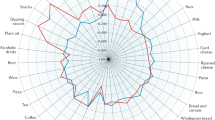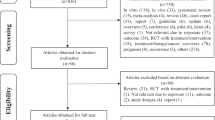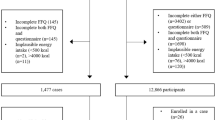Abstract
Chemoprevention of colorectal cancer has been the focus of intensive research for more than two decades. Epidemiological evidence has shown a small, but significant association between fruit and vegetable intake and a reduction in colorectal cancer risk. In vitro and animal data have also demonstrated that many dietary phytochemicals have potent chemopreventive activities. However, in humans, single-agent compounds have yielded conflicting results. A key concept is that dietary phytochemicals exert beneficial effects at low concentrations when working in synergy with each other. As the gut microflora evolved in an environment rich in dietary fiber and phytochemicals, the rapid shift towards a Western diet creates an environment in which the gut is more vulnerable to carcinogens, genetic alterations and inflammation. As enforcing dietary interventions on large populations is not realistic, we believe future chemopreventive work should focus on delivering phytochemical mixtures that target the multiple molecular events involved in colorectal carcinogenesis.
This is a preview of subscription content, access via your institution
Access options
Subscribe to this journal
Receive 12 print issues and online access
$209.00 per year
only $17.42 per issue
Buy this article
- Purchase on Springer Link
- Instant access to full article PDF
Prices may be subject to local taxes which are calculated during checkout

Similar content being viewed by others
References
Jemal, A. et al. Global cancer statistics. CA Cancer J. Clin. 61, 69–90 (2011).
Center, M. M., Jemal, A. & Ward, E. International trends in colorectal cancer incidence rates. Cancer Epidemiol. Biomarkers Prev. 18, 1688–1694 (2009).
Siegel, R. L., Jemal, A. & Ward, E. M. Increase in incidence of colorectal cancer among young men and women in the United States. Cancer Epidemiol. Biomarkers Prev. 18, 1695–1698 (2009).
Larsson, S. C. & Wolk, A. Obesity and colon and rectal cancer risk: a meta-analysis of prospective studies. Am. J. Clin. Nutr. 86, 556–565 (2007).
Gunter, M. J. & Leitzmann, M. F. Obesity and colorectal cancer: epidemiology, mechanisms and candidate genes. J. Nutr. Biochem. 17, 145–156 (2006).
Newmark, H. L. et al. A Western-style diet induces benign and malignant neoplasms in the colon of normal C57Bl/6 mice. Carcinogenesis 22, 1871–1875 (2001).
Bjorge, T., Engeland, A., Tverdal, A. & Smith, G. D. Body mass index in adolescence in relation to cause-specific mortality: a follow-up of 230,000 Norwegian adolescents. Am. J. Epidemiol. 168, 30–37 (2008).
Aune, D. et al. Nonlinear reduction in risk for colorectal cancer by fruit and vegetable intake based on meta-analysis of prospective studies. Gastroenterology 141, 106–118 (2011).
Botma, A. et al. Body mass index increases risk of colorectal adenomas in men with Lynch syndrome: the GEOLynch cohort study. J. Clin. Oncol. 28, 4346–4353 (2010).
Diergaarde, B. et al. Environmental factors and colorectal tumor risk in individuals with hereditary nonpolyposis colorectal cancer. Clin. Gastroenterol. Hepatol. 5, 736–742 (2007).
Nomura, A. M. et al. Association of vegetable, fruit, and grain intakes with colorectal cancer: the Multiethnic Cohort Study. Am. J. Clin. Nutr. 88, 730–737 (2008).
van Duijnhoven, F. J. et al. Fruit, vegetables, and colorectal cancer risk: the European Prospective Investigation into Cancer and Nutrition. Am. J. Clin. Nutr. 89, 1441–1452 (2009).
Dahm, C. C. et al. Dietary fiber and colorectal cancer risk: a nested case-control study using food diaries. J. Natl Cancer Inst. 102, 614–626 (2010).
Fung, T. T. et al. The Mediterranean and Dietary Approaches to Stop Hypertension (DASH) diets and colorectal cancer. Am. J. Clin. Nutr. 92, 1429–1435 (2010).
Rossi, M. et al. Flavonoids and colorectal cancer in Italy. Cancer Epidemiol. Biomarkers Prev. 15, 1555–1558 (2006).
Rajamanickam, S. & Agarwal, R. Natural products and colon cancer: current status and future prospects. Drug Dev. Res. 69, 460–471 (2008).
Tammariello, A. E. & Milner, J. A. Mouse models for unraveling the importance of diet in colon cancer prevention. J. Nutr. Biochem. 21, 77–88 (2010).
Greenberg, E. R. et al. A clinical trial of antioxidant vitamins to prevent colorectal adenoma. Polyp Prevention Study Group. N. Engl. J. Med. 331, 141–147 (1994).
Alberts, D. S. et al. Lack of effect of a high-fiber cereal supplement on the recurrence of colorectal adenomas. Phoenix Colon Cancer Prevention Physicians' Network. N. Engl. J. Med. 342, 1156–1162 (2000).
MacLennan, R. et al. Randomized trial of intake of fat, fiber, and beta carotene to prevent colorectal adenomas. J. Natl Cancer Inst. 87, 1760–1766 (1995).
Schatzkin, A. et al. Lack of effect of a low-fat, high-fiber diet on the recurrence of colorectal adenomas. Polyp Prevention Trial Study Group. N. Engl. J. Med. 342, 1149–1155 (2000).
Scott, E. N., Gescher, A. J., Steward, W. P. & Brown, K. Development of dietary phytochemical chemopreventive agents: biomarkers and choice of dose for early clinical trials. Cancer Prev. Res. (Phila). 2, 525–530 (2009).
Surh, Y. J. & Chun, K. S. Cancer chemopreventive effects of curcumin. Adv. Exp. Med. Biol. 595, 149–172 (2007).
Yang, C. S. & Wang, H. Mechanistic issues concerning cancer prevention by tea catechins. Mol. Nutr. Food Res. 55, 819–831 (2011).
Schneider, Y. et al. Resveratrol inhibits intestinal tumorigenesis and modulates host-defense-related gene expression in an animal model of human familial adenomatous polyposis. Nutr. Cancer 39, 102–107 (2001).
Rajamanickam, S., Velmurugan, B., Kaur, M., Singh, R. P. & Agarwal, R. Chemoprevention of intestinal tumorigenesis in APCmin/+ mice by silibinin. Cancer Res. 70, 2368–2378 (2010).
Shen, G. et al. Chemoprevention of familial adenomatous polyposis by natural dietary compounds sulforaphane and dibenzoylmethane alone and in combination in ApcMin/+ mouse. Cancer Res. 67, 9937–9944 (2007).
Fini, L. et al. Highly purified eicosapentaenoic acid as free fatty acids strongly suppresses polyps in Apc(Min./+) mice. Clin. Cancer Res. 16, 5703–5711 (2010).
West, N. J. et al. Eicosapentaenoic acid reduces rectal polyp number and size in familial adenomatous polyposis. Gut 59, 918–925 (2010).
Pan, M. H., Lai, C. S., Wu, J. C. & Ho, C. T. Molecular mechanisms for chemoprevention of colorectal cancer by natural dietary compounds. Mol. Nutr. Food Res. 55, 32–45 (2011).
Taketo, M. M. & Edelmann, W. Mouse models of colon cancer. Gastroenterology 136, 780–798 (2009).
Fearon, E. R. & Vogelstein, B. A genetic model for colorectal tumorigenesis. Cell 61, 759–767 (1990).
Grady, W. M. & Carethers, J. M. Genomic and epigenetic instability in colorectal cancer pathogenesis. Gastroenterology 135, 1079–1099 (2008).
Beauchemin, N. The colorectal tumor microenvironment: the next decade. Cancer Microenviron. http://dx.doi.org/10.1007/s12307-011-0074-7.
Peddareddigari, V. G., Wang, D. & Dubois, R. N. The tumor microenvironment in colorectal carcinogenesis. Cancer Microenviron. 3, 149–166 (2010).
McLean, M. H. et al. The inflammatory microenvironment in colorectal neoplasia. PLoS ONE 6, e15366 (2011).
Paul, S. et al. Dietary intake of pterostilbene, a constituent of blueberries, inhibits the beta-catenin/p65 downstream signaling pathway and colon carcinogenesis in rats. Carcinogenesis 31, 1272–1278 (2010).
Villegas, I., Sanchez-Fidalgo, S. & de la Lastra, C. A. Chemopreventive effect of dietary curcumin on inflammation-induced colorectal carcinogenesis in mice. Mol. Nutr. Food Res. 55, 259–267 (2011).
Baron, J. A. et al. A randomized trial of rofecoxib for the chemoprevention of colorectal adenomas. Gastroenterology 131, 1674–1682 (2006).
Bertagnolli, M. M. et al. Celecoxib for the prevention of sporadic colorectal adenomas. N. Engl. J. Med. 355, 873–884 (2006).
Bresalier, R. S. et al. Cardiovascular events associated with rofecoxib in a colorectal adenoma chemoprevention trial. N. Engl. J. Med. 352, 1092–1102 (2005).
Bode, A. M. & Dong, Z. Epigallocatechin 3-gallate and green tea catechins: united they work, divided they fail. Cancer Prev. Res. (Phila). 2, 514–517 (2009).
Ju, J. et al. Inhibition of intestinal tumorigenesis in Apcmin/+ mice by (-)-epigallocatechin-3-gallate, the major catechin in green tea. Cancer Res. 65, 10623–10631 (2005).
Fini, L. et al. Chemoprevention of intestinal polyps in ApcMin/+ mice fed western or balanced diets by drinking Annurca apple polyphenol extract. Cancer Prev. Res. (Phila). 4, 907–915 (2011).
Sukhthankar, M. et al. A green tea component suppresses posttranslational expression of basic fibroblast growth factor in colorectal cancer. Gastroenterology 134, 1972–1980 (2008).
Chang, P. Y. et al. Genotoxicity and toxicity of the potential cancer-preventive agent polyphenon E. Environ. Mol. Mutagen. 41, 43–54 (2003).
Hao, X. et al. Inhibition of intestinal tumorigenesis in Apc(min/+) mice by green tea polyphenols (polyphenon E) and individual catechins. Nutr. Cancer 59, 62–69 (2007).
Roswall, N. et al. Micronutrient intake and risk of colon and rectal cancer in a Danish cohort. Cancer Epidemiol. 34, 40–46 (2010).
Wallace, K. et al. Association between folate levels and CpG Island hypermethylation in normal colorectal mucosa. Cancer Prev. Res. (Phila). 3, 1552–1564 (2010).
Hooper, L. V. & Gordon, J. I. Commensal host-bacterial relationships in the gut. Science 292, 1115–1118 (2001).
Gibson, G. R. & Roberfroid, M. B. Dietary modulation of the human colonic microbiota: introducing the concept of prebiotics. J. Nutr. 125, 1401–1412 (1995).
Flint, H. J., Duncan, S. H., Scott, K. P. & Louis, P. Interactions and competition within the microbial community of the human colon: links between diet and health. Environ. Microbiol. 9, 1101–1111 (2007).
Reddy, B. S. & Ohmori, T. Effect of intestinal microflora and dietary fat on 3, 2′-dimethyl-4-aminobiphenyl-induced colon carcinogenesis in F344 rats. Cancer Res. 41, 1363–1367 (1981).
Vannucci, L. et al. Colorectal carcinogenesis in germ-free and conventionally reared rats: different intestinal environments affect the systemic immunity. Int. J. Oncol. 32, 609–617 (2008).
Vitaglione, P., Napolitano, A. & Fogliano, V. Cereal dietary fibre: a natural functional ingredient to deliver phenolic compounds into the gut. Trends Food Sci. Technol. 19, 451–463 (2008).
Babbs, C. F. Free radicals and the etiology of colon cancer. Free Radic. Biol. Med. 8, 191–200 (1990).
Dethlefsen, L., Eckburg, P. B., Bik, E. M. & Relman, D. A. Assembly of the human intestinal microbiota. Trends Ecol. Evol. 21, 517–523 (2006).
Cani, P. D. et al. Changes in gut microbiota control metabolic endotoxemia-induced inflammation in high-fat diet-induced obesity and diabetes in mice. Diabetes 57, 1470–1481 (2008).
Cruz-Correa, M. et al. Combination treatment with curcumin and quercetin of adenomas in familial adenomatous polyposis. Clin. Gastroenterol. Hepatol. 4, 1035–1038 (2006).
Augustin, M. A. & Hemar, Y. Nano- and micro-structured assemblies for encapsulation of food ingredients. Chem. Soc. Rev. 38, 902–912 (2009).
Poulsen, M. et al. The effect of apple feeding on markers of colon carcinogenesis. Nutr. Cancer 63, 402–409 (2011).
Soyalan, B. et al. Apple juice intervention modulates expression of ARE-dependent genes in rat colon and liver. Eur. J. Nutr. 50, 135–143 (2011).
Rajakangas, J., Misikangas, M., Paivarinta, E. & Mutanen, M. Chemoprevention by white currant is mediated by the reduction of nuclear beta-catenin and NF-kappaB levels in Min. mice adenomas. Eur. J. Nutr. 47, 115–122 (2008).
Lala, G. et al. Anthocyanin-rich extracts inhibit multiple biomarkers of colon cancer in rats. Nutr. Cancer 54, 84–93 (2006).
Raju, J. et al. Soy isoflavones modulate azoxymethane-induced rat colon carcinogenesis exposed pre- and postnatally and inhibit growth of DLD-1 human colon adenocarcinoma cells by increasing the expression of estrogen receptor-beta. J. Nutr. 139, 474–481 (2009).
Acknowledgements
Funded by the Italian Association for Cancer Research (AIRC) (to L. Ricciardiello).
Author information
Authors and Affiliations
Contributions
L. Ricciardiello and V. Fogliano researched the data for the article and contributed equally to writing it. F. Bazzoli provided a substantial contribution to discussions of the content and to reviewing and/or editing the manuscript before submission.
Ethics declarations
Competing interests
L. Ricciardiello and V. Fogliano have filed a patent application for the anti-cancer and anti-inflammatory properties of Annurca Apple extracts and compositions purified therefrom (US patent Publication No. 2009/0076131, published 19 March 2009). L. Ricciardiello has received a research grant from SLA Pharma, UK. F. Bazzoli declares no competing interests.
Rights and permissions
About this article
Cite this article
Ricciardiello, L., Bazzoli, F. & Fogliano, V. Phytochemicals and colorectal cancer prevention—myth or reality?. Nat Rev Gastroenterol Hepatol 8, 592–596 (2011). https://doi.org/10.1038/nrgastro.2011.149
Published:
Issue Date:
DOI: https://doi.org/10.1038/nrgastro.2011.149
This article is cited by
-
Anticarcinogenic Effect of Corn Tortilla Against 1,2-Dimethylhydrazine (DMH)-Induced Colon Carcinogenesis in Sprague–Dawley Rats
Plant Foods for Human Nutrition (2015)
-
Ernährung in der Krebsprävention
Forum (2014)



